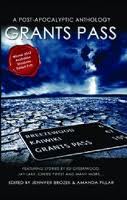 Morrigan Books, 2009
Morrigan Books, 2009
I was first sent a review copy of Grants Pass when it was published in 2009. In the time it took for me to get around to reading and reviewing it three years later (like, er, y’know, now), it picked up the 2010 Australian Shadows Award for edited publication – and,now that I’ve finally had the pleasure of devouring the book for myself, I can see why.
Like many good things, Grants Pass was a long time in the making. The concept originated from a blog post by Jennifer Brozek in 2004, a “thought exercise” positing the notion that, when the world ends, everyone should meet in a pre-destined place to pick up the pieces and carry on. The responses Brozek received led her to the idea of the Grants Pass anthology, which, after much pitching and reworking, came to fruition in partnership with her co-editor Amanda Pillar and publisher Morrigan Books. Brozek’s original blog post was used as inspiration for a journal entry by Kayley Allard which kicks off the anthology, and provides the central point (and a sort of meta-character-contributing-author) around which the entire book revolves: “when the end of the world comes, meet me in Grants Pass, Oregon”.
The end of the world does indeed come, thanks to three plagues released by terrorists (why, who, how, and to what end other than total annihilation of the planet is not explained), and a wave of very nasty natural disasters. Eighteen stories nestle between the covers of Grants Pass, detailing what comes next for survivors of the apocalypse. Each of the stories are never anything less than very good. Some are superb.
The standout piece for me was definitely Animal Husbandry by Seanan McGuire. A bleak, blunt story with an ethically curious core, this one stayed with me long after I put the book down. Touching on themes of euthanasia and humans as “domesticated animals” (I particularly enjoyed that perspective), and pulling no punches, this is an important, expertly told story. I remain perplexed as to where I stand on the protagonist’s actions. A very clever unexpected tale.
Several other stories were also striking (well, they all were, in their own unique ways – and that’s astonishingly rare in an anthology – but I’ve decided not to cover every story in this review, so will stick to the few that really leapt off the page at me). The disturbingly poetic Hell’s Bells by Cherie Priest was told from the point of view of a troubled young child with a morbid fascination with death and the bells that toll for it, and very little regard for human beings in general. Ascension by Martin Livings was probably the most original take on the end of the world theme, told from outside the planet looking in, and involving a stroll through space that truly chilled and moved me. Black Heart, White Mourning by Jay Lake introduced a frightening and unlikable mentally ill protagonist who I found myself nonetheless sympathising with due to Lake placing me squarely inside the character’s head – an impressive feat of authentic dialogue.
Grants Pass is vaguely reminiscent of Stephen King’s The Stand, what with the whole “illness wiping the world out and survivors being their own worst enemies” thing, though there is no religious apocalypse or any supernatural elements at all in the anthology – all the tales are very human indeed, and centred in a gritty, realistic future dystopia, told from various points around (and in one instance, outside) the globe. The horror in Grants Pass stems from these truths: people we love die and we can’t stop it, life is fragile, people can be terrible, loneliness can bring madness, and survival is something almost all of us have never really had to fight for before – and would be ill-prepared to do so if forced to.
I think the ultimate strong point of Grants Pass is its cohesiveness – the shared character (Kayley) and theme (Kayley’s blog post urging survivors towards Grants Pass) work to provide a united suite of stories and an immersive reading experience, which in turn forms an irresistible emotional connection between reader and words. Post apocalyptic fiction needs to make us care, or it just falls flat. Grants Pass made me care, and broke my heart more than a few times over.
Grants Pass has few weak points, and really I’m only pointing them out here for the sake of pure objectivity, so as not to write a review that is in fact just gushing praise (which is what I really want to do). One or two stories, whilst beautifully rendered, felt somewhat more like settings than fully developed narratives, but I enjoyed them nonetheless. The very cohesiveness that works so well for the collection can also bring a feeling of “sameness” and repetition; I liked that feeling, but some readers may need to take a break before diving back into the book to truly appreciate it. A few stories were harder for me to connect to because their locations and language were so far removed from anything I’ve personally experienced – but that in itself is a blessing, an educational journey within print – and I liked that not every story was set in the same geographical location.
Quite simply, I didn’t want this book to end. Highly recommended. Morrigan Books regularly release stylish, top-quality literature, and Grants Pass is no exception. It’s 2012; there’s no better time to read about the end of the world, and few better places to read about it than Grants Pass.










